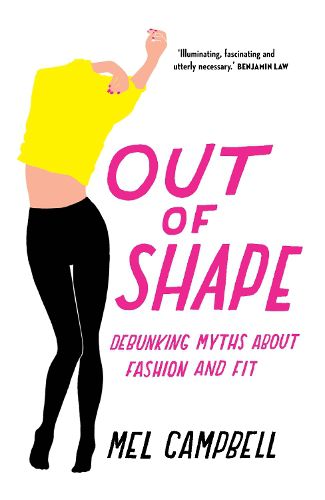Readings Newsletter
Become a Readings Member to make your shopping experience even easier.
Sign in or sign up for free!
You’re not far away from qualifying for FREE standard shipping within Australia
You’ve qualified for FREE standard shipping within Australia
The cart is loading…






I’m in a change room, flailing around with a dress stuck over my head, trying desperately not to alert the sales assistant to my struggles. Not every change-room experience is as humiliating as this, but the frequent frustrations and ‘bad fits’ are like loose threads threatening to unravel the self-esteem of just about every shopper. From corsets to skinny jeans, we have always fretted about our body shapes and why it’s so damn difficult to find a good fit.
In this bold and entertaining book, Mel Campbell examines the tensions that have always existed in clothing between our cultural ideals and our own bodies. Through lively interviews, her own experiences, and visits to vintage fairs, museums and galleries, Mel explores why we are still so critical of our various shapes and restricted by old-fashioned values.
Challenging our perceptions of fashion and debunking myths about size and fit, Out of Shape reveals how, when it comes to clothes, the past and present are cut from the same cloth.
$9.00 standard shipping within Australia
FREE standard shipping within Australia for orders over $100.00
Express & International shipping calculated at checkout
I’m in a change room, flailing around with a dress stuck over my head, trying desperately not to alert the sales assistant to my struggles. Not every change-room experience is as humiliating as this, but the frequent frustrations and ‘bad fits’ are like loose threads threatening to unravel the self-esteem of just about every shopper. From corsets to skinny jeans, we have always fretted about our body shapes and why it’s so damn difficult to find a good fit.
In this bold and entertaining book, Mel Campbell examines the tensions that have always existed in clothing between our cultural ideals and our own bodies. Through lively interviews, her own experiences, and visits to vintage fairs, museums and galleries, Mel explores why we are still so critical of our various shapes and restricted by old-fashioned values.
Challenging our perceptions of fashion and debunking myths about size and fit, Out of Shape reveals how, when it comes to clothes, the past and present are cut from the same cloth.
Mel Campbell has a brilliant eye for popular culture, as anyone who’s followed her blog, A Wild Young Under-Whimsy, or her other writing will know. Her first book, Out of Shape, tackles the fashion industry on the issues of sizing, fit and feel, and is a smart, sharp mix of cultural anthropology, first-person journalism and online trawling.
Out of Shape isn’t a fashion glossy or a confessional. Rather, it’s a look at how the industry works on a social level: how what we’re offered influences what we wear, how what we wear makes us feel about ourselves and others, and what this signals to the broader social strata in return. It’s about bodies and ideals, reflections and distortions, gazes and doubts.
Most of all, it’s a fascinating examination of what popular culture and fashion actually are – a manifestation of both the lowbrow and the high. Campbell travels easily from dreamscapes of couture to Target’s latest 3D body scanning booth. She explores the evolution of standardised sizing, as well as fashion’s many waves, from Regency-era dandies to the queens of French gamine. From there, Out of Shape goes deep into the arteries of media storms and gossip rags – wardrobe malfunctions, slut shaming and plus-size modelling. There is as well a genuine love of materials and clothes, with savouring descriptions of garments and styles, films and fantasy: low-retro, mid-century glam, 1950s crinoline petticoats, rolled fringes and 80s excesses.
Throughout, Campbell is also savvy to the ironies and inequalities of where research can lead. The antique garments often housed and treasured in museums, for instance, will only ever represent the lives of a select privileged few, and not that of ethnic minorities or the working class. Stores often don’t stock larger sizes not because they aren’t aware that the majority of women aren’t a size 8, but because they deliberately want to restrict their clientele. This is exactly the type of writing that I love – intellectually charged, feminist and smart.